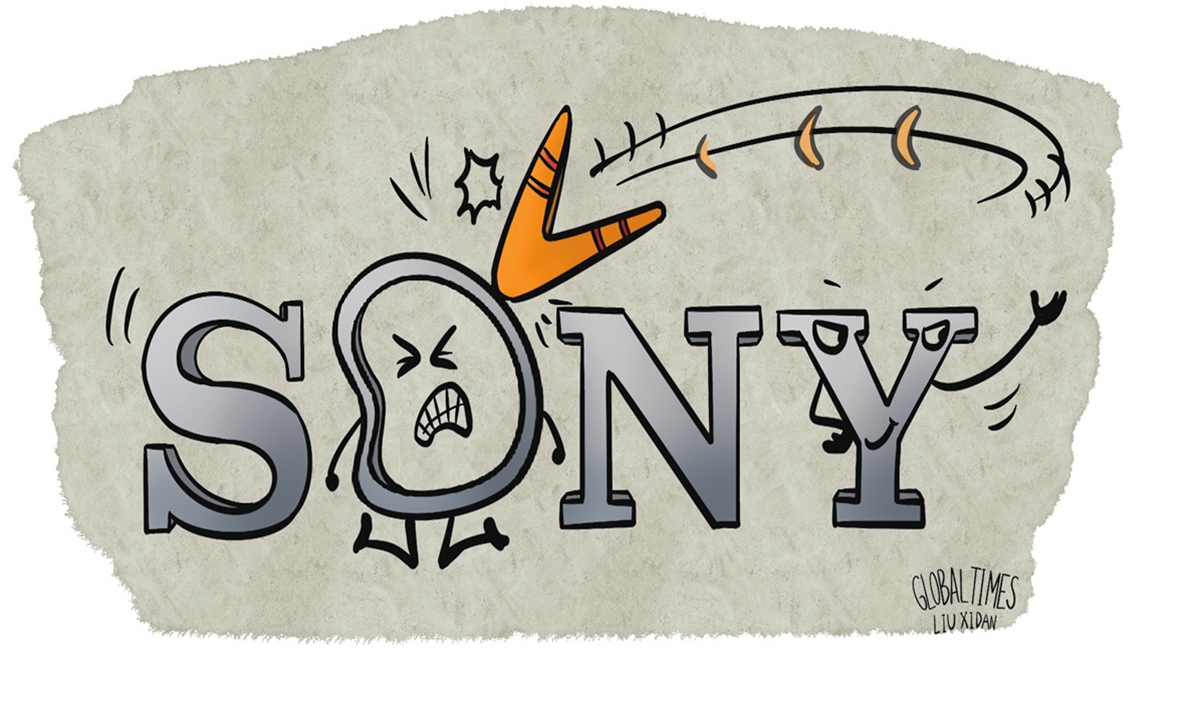ARTS / ART
Sony should be held accountable for defaming Chinese hero

Illustration: Liu Xidan/Global Times
Last week, the official Sina Weibo account of Sony (China) Co Ltd, known as Sony China, was banned from posting on the platform. Although the official reason given was that the Sony China account "violated related laws," Chinese netizens said that the ban was punishment for a 2022 post that many people saw as insulting Chinese heroic martyr Qiu Shaoyun.
On October 12, 2022, Sony China published a post quoting a line from a poem from late Chairman Mao Zedong: "When the flowers were in full bloom, she smiled among the bushes." Along with the quote, the post attached a picture of the head of a black dog surrounded by red flowers. The verse was originally meant to extol the plum blossom in the snow that symbolizes the tenacious spirit of the members of the Communist Party of China in facing hardship.
In early January 2023, some scrupulous Chinese netizens suspected that the picture of a dog hiding in the flowers was an insult against Chinese hero Qiu Shaoyun. Qiu gave his life during the War to Resist US Aggression and Aid Korea (1950-53) when enemy troops dropped incendiary explosives on his position while his unit was waiting in ambush.
To ensure the success of the mission and not give away his unit's position, the brave solider allowed himself to be burned to death rather than try to save himself by jumping into a nearby stream. Netizens pointed out that the post was made on the 70th anniversary of Qiu's death. And the flower and dog combination shows hints of a well-known oil painting depicting the moments before Qiu's death in the fire.
On January 4, Sony China was forced to remove the post and its account was currently banned.
Some people have jumped to Sony's defense by saying posting on that very day was "just a coincidence," but is that really the case?
This is not the first time Sony China has made serious mistakes. Let's look at some of Sony China's other posts from the recent past.
On December 13, 2019, the Chinese National Memorial Day for Victims of the Nanjing Massacre, Sony China rolled out a new style of "noise reduction" earphones with the slogan "never compromise."
On June 30, 2021, Sony China released a poster to announce that a new product would be launched on July 7, 2021. July 7 is the day of the the Lugou Bridge Incident, which Western historians usually dub as the Marco Polo Bridge Incident, an incident happened in 1937 between Japanese and Chinese forces outside Beijing that marked the start of overall outbreak of the Chinese People's War of Resistance against Japanese Aggression (1931-45).
One case may be a coincidence, but how about three in a row? It is obvious that posting these contents on sensitive days are no accident at all but a clear sign of Sony China's ill intention to defame China. It is simply natural such posts would stir up Chinese netizens' resentment. It should be noted that these acts violate China's law on the protection of heroes and martyrs.
According to this law, no organization or individual may insult, slander or infringe upon the names, portraits, reputation or honor of heroes and martyrs in public places, on the internet or through radio, television, films or publications. Those who do so will face administrative or criminal punishments.
For instance, for the poster related to July 7, Sony China was fined 1 million yuan ($0.15 million) by Beijing's market regulator on October 12, 2021.
The picture Sony China posted on October 12, 2022 is an indirect attempt to humiliate a Chinese national hero while skirting Chinese law and is indicative of a greater trend. And that is why it took so long to work out the penalty and confirm its violations.
Sony China's repeated involvements in these mistakes and refusal to admit their true purpose have shown its arrogance toward the Chinese market and indicated a loophole in its management.
Sony China should abide by the Chinese law, as any foreign company should have, and respect Chinese culture, especially the Red Culture relating to the Communist Party of China and China's recent revolutionary history. This is their responsibility!
If it still wants to make money in China, it should reflect on the atrocities that Japanese militarists had committed in China and in a large part of Asia and provide a sincere apology to the victims. Otherwise, it should, as Chinese netizens have advocated, "get out of China as soon as possible."
A law-breaking company should not make money in any market.


